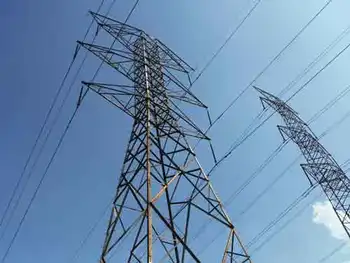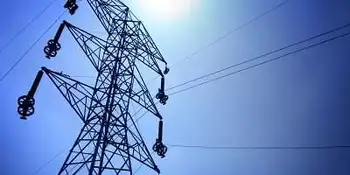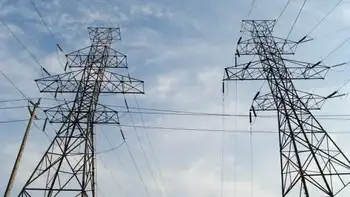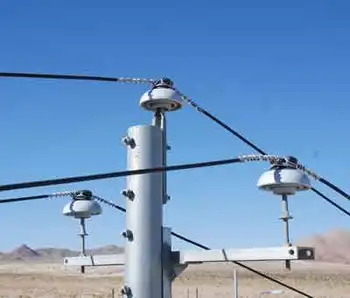Beleaguered Alberta energy regulator faces three probes over spying
The Alberta Energy and Utilities Board (AEUB), an independent, quasi-judicial agency of the government, now faces three separate investigations into the actions of private detectives it hired to watch a group of landowners fighting a massive power line project.
Anthony Heinrich, a landowner and municipal councillor for Brazeau County, says public confidence in the regulator has been shaken by the spying allegations. He was also greatly disappointed to see Stelmach initially defend the use of undercover investigators.
"We have a government and a premier that keeps talking about being open, honest and transparent," he said in an interview. "I'm not real confident in the government investigating an organization that is also a wing of the government.
"I think an independent individual would be more appropriate."
Heinrich says his own experiences with the board have left him with the impression that the regulator is biased.
"They lean very heavily in terms of the emphasis they place on industry's needs," Heinrich said in an interview. "The majority of their funding comes from industry."
Board spokesman Davis Sheremata confirmed last month that undercover investigators were hired to blend into the crowd at a community hall in Rimbey where dozens of people had gathered to watch closed-circuit TV coverage of the power line hearings. But he insisted the investigators were simply ensuring the crowd's safety after some pushing and shouting at an earlier hearing in Red Deer.
"They were not contracted in any way to intrude on private, confidential or privileged conversations in any way," he said.
But the landowners and their lawyers say the investigators eavesdropped on their conversations and even got a password from them to join an Internet forum to discuss the contentious 500-kilovolt power line project between Edmonton and Calgary.
Jim Wachowich, a lawyer who handles utility issues in Alberta for the Consumers Association of Canada, calls it a serious mistake that has left the board with "an unfortunate black eye."
"I have seen this rise to the forefront," Wachowich said. "Utility hearings are rarely the subject of dinner table conversation in most parts of the province."
Although the board's actions were initially also defended by Energy Minister Mel Knight, a growing public outcry resulted in investigations by the privacy commissioner and Alberta's ombudsman.
In an apparent about-face, Knight then announced his own investigation. The minister also took the unusual step of issuing an open letter to Albertans saying, "In hindsight, it is clear that these security measures could have been handled better.
"I understand that the public's faith in our regulatory system has been affected by what has occurred and by the allegations that have been made in recent weeks."
Liberal energy critic Hugh MacDonald contends that public confidence in the regulator has been eroding for several years "because the AEUB has rubber-stamped so many approvals in favour of industry."
"When you spy on the citizens, how do you expect them to turn around and have confidence in the regulatory process?"
Bob Curran, head of public affairs for the board, says he's heard the comments about the regulator rubber-stamping approvals and appearing toothless at times. But he says they come from "a fairly small group of people that are very angry with us and have been all along."
"We've been called Gestapo and we've been accused of running people off the road, and hints of dark conspiracies have been floated out there on a continuous basis.
"I think the broader public in Alberta that know us and deal with us recognize that we are a very reputable organization. We're neutral, we're fair and we're balanced."
Stelmach has said he considers public confidence in the AEUB to be paramount, especially as Alberta moves forward with massive new energy and utility projects.
But legislation introduced recently to restructure the regulator and change the rules for public involvement in the review process has created a uproar among some groups, including landowners fighting the various power line projects.
MacDonald describes Bill 46 as an attempt to muzzle opposition.
"Bill 46 is really going to restrict and limit citizens from participating in the regulatory approval process for any future power plants or expanded transmission lines," he said.
"They want to rubber-stamp the projects to expand our transmission system without any questions from the citizens."
Wachowich also expects to see a groundswell of resentment over Bill 46, which removes the guarantee of funding that has been available since 1915 for Albertans who take part in the regulatory process - often those who oppose the project under review.
But Energy Minister Knight rejects any suggestion that Bill 46 will muzzle or restrict public participation.
"We'll have the Utilities Consumer Advocate in there to do any and all of the intervening that any of the small players want him to do," Knight said in an interview. "It is not at all restrictive. As a matter of fact, it's the opposite."
Related News
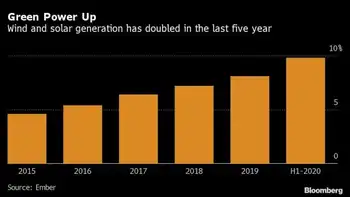
Wind and Solar Double Global Share of Electricity in Five Years
LONDON - Wind and solar energy doubled its share of the global power mix over the last five years, moving the world closer to a path that would limit the worst effects of global warming.
The sources of renewable energy made up nearly 10% of power in most parts of the world in the first half of this year, according to analysis from U.K. environmental group Ember.
That decarbonization of the power grid was boosted this year as shutdowns to contain the coronavirus reduced demand overall, leaving renewables to pick up the slack.
Ember analyzed generation in 48 countries that represent 83% of…


